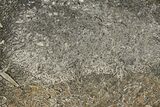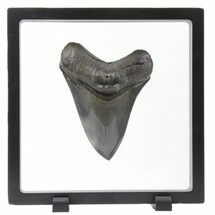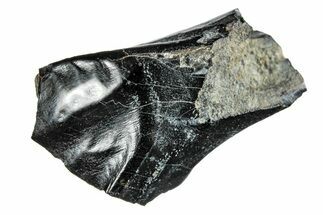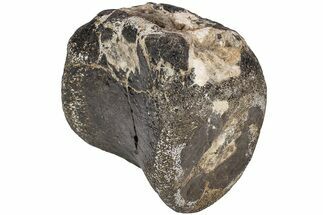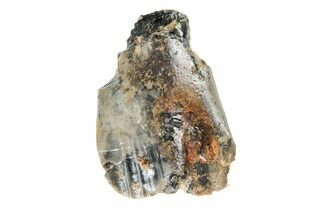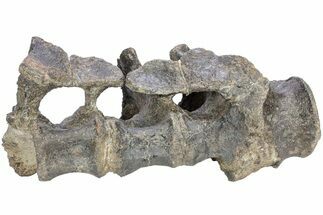This Specimen has been sold.
4.8" Pyritized, Polished Iguanodon Bone - Isle Of Wight
This 4.8" wide is a slab of polished, Iguanodon bone showing stunning internal cell structure. It has been partially replaced with iron pyrite. It was collected from the Lower Cretaceous, Wealden Clay Formation on the Isle of Wight. While complete or near complete bones are rare, water tumbled chunks are often found after they erode out of the cliffs on the isle.
It comes with an acrylic display stand.
It comes with an acrylic display stand.
About Iguanodon
Iguanodon was a large, herbivorous dinosaur that lived during the Early Cretaceous period, approximately 125 million years ago. It belonged to the group of dinosaurs called ornithopods, known for their bird-like, bipedal stance. Iguanodon was among the first dinosaurs to be discovered and named, with fossils first identified in the early 19th century. It is recognizable for its robust, bulky body, long tail, and a distinctive thumb spike, which likely served as a defense mechanism against predators or as a tool for foraging.
Typically reaching lengths of about 30 feet and weighing up to 5 tons, Iguanodon had strong hind legs, allowing it to move both bipedally and quadrupedally, depending on the situation. Its broad, beaked mouth was well-suited for cropping vegetation, and its grinding teeth suggest it primarily ate tough plants. The discovery of Iguanodon provided crucial insights into the diversity and evolution of dinosaurs, marking it as a significant find in paleontology.
The name is derived from 'Iguana', a modern reptile, and 'don', meaning tooth. Scientists used to believe that two species of Iguanodon were found on the Isle of Wight, but one species has been moved off into another genus.
Iguanodon was a large, herbivorous dinosaur that lived during the Early Cretaceous period, approximately 125 million years ago. It belonged to the group of dinosaurs called ornithopods, known for their bird-like, bipedal stance. Iguanodon was among the first dinosaurs to be discovered and named, with fossils first identified in the early 19th century. It is recognizable for its robust, bulky body, long tail, and a distinctive thumb spike, which likely served as a defense mechanism against predators or as a tool for foraging.
Typically reaching lengths of about 30 feet and weighing up to 5 tons, Iguanodon had strong hind legs, allowing it to move both bipedally and quadrupedally, depending on the situation. Its broad, beaked mouth was well-suited for cropping vegetation, and its grinding teeth suggest it primarily ate tough plants. The discovery of Iguanodon provided crucial insights into the diversity and evolution of dinosaurs, marking it as a significant find in paleontology.
The name is derived from 'Iguana', a modern reptile, and 'don', meaning tooth. Scientists used to believe that two species of Iguanodon were found on the Isle of Wight, but one species has been moved off into another genus.
SPECIES
Iguanodon
LOCATION
Isle of Wight, UK
FORMATION
Wealden Clay
SIZE
4.8" wide
CATEGORY
SUB CATEGORY
ITEM
#131197
We guarantee the authenticity of all of our specimens.
 Reviews
Reviews





